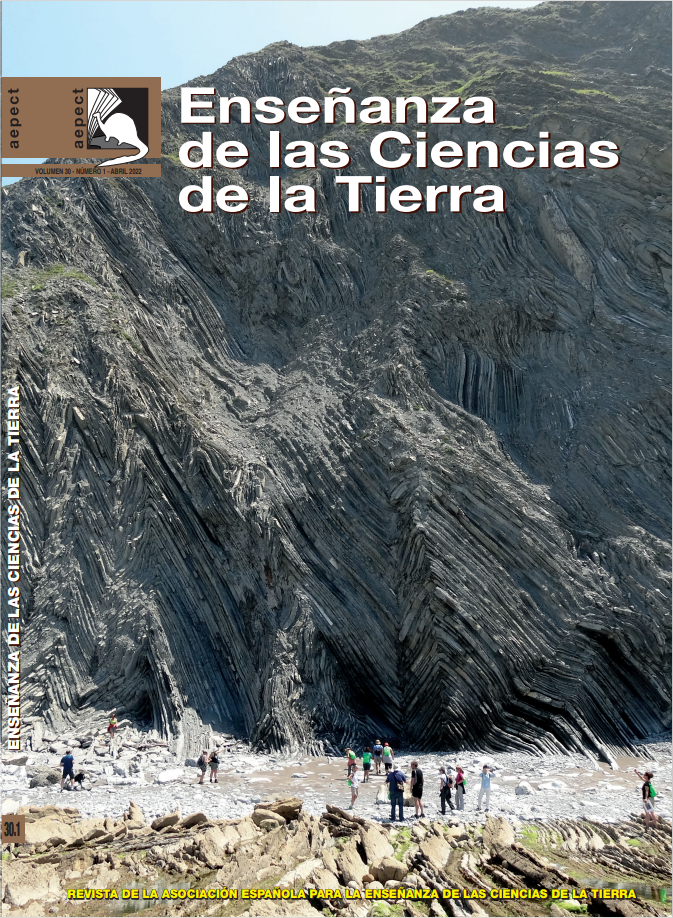Technological innovation in the gamification of Earth sciences the example of “Evolutionary” and the use of AI
Article Sidebar

Main Article Content
“Evolutionary” was created in 2019 as part of the XIX Madrid Science and Innovation Week to disseminate palaeontology and geology concepts through a board game. However, the pandemic derived from SARS-COVID-19 forced us to adapt this game to an online format in 2020 and 2021. To carry out this adaptation, we used accessible and simple tools, easy to replicate without the need for prior programming knowledge. Microsoft Office PowerPoint was key in adapting “Evolutionary” thanks to tools such as animations or the generation of hyperlinks, allowing the creation of interactive and attractive presentations that captured the audience’s attention. Whenever possible, the original game tests were adapted with this software, and when not, external online resources were used and shared via links through the Google Meet chat. These innovations introduced in the game motivated the creation of new game tests and the evaluation of generative Artificial Intelligences as a teaching and dissemination resource. Therefore, the virtual adaptation has made it possible to create new dynamics in an easy way that do not arise with the face[1]to-face game, but it also allows the use of innovative tools such as Artificial Intelligence to generate gamification resources that teach participants to be critical and to make responsible and ethical use of it.
Article Details
(c) 2024
Copyright
8. Los autores ceden los derechos de copyright a AEPECT. La Revista de Enseñanza de las Ciencias de la Tierra renuncia expresamente al copyright sobre los trabajos que publica, siempre que éstos sean utilizados en la práctica docente y se especifique su procedencia. Queda prohibida, no obstante, la reproducción total o parcial de textos e ilustraciones de la revista con fines comerciales sin la autorización escrita de la AEPECT.Most read articles by the same author(s)
- Dánae Sanz-Pérez, Irene Cambronero, Josué García-Cobeña, Víctor G. Peco, Sergio M. Nebreda, Senay Ozkaya de Juanas, Omid Fesharaki, Alejandra García-Frank, "EVOLUTIONARY": DIVULGACIÓN Y ENSEÑANZA DE LA PALEONTOLOGÍA MEDIANTE LA GAMIFICACIÓN , Enseñanza de las Ciencias de la Tierra: Vol. 28 No. 1 (2020): Gamificación y aprendizaje basado en juegos
- Noelia Sànchez-Fontela, Mélani Berrocal-Casero, Omid Fesharaki, Alejandra García-Frank, Ana Rodrigo, Aprendizaje basado en el diseño universal: talleres sobre Paleontología de invertebrados, mapas paleográficos y la deriva continental , Enseñanza de las Ciencias de la Tierra: Vol. 27 No. 2 (2019)
- M. Belén Muñoz-García, Laura González-Acebrón, Alejandra García-Frank, Rosa Pérez Barroso, Belén Espín Forjan, Piedad Benito Manjón, Leticia de Pablo Gutiérrez, Miguel Gómez-Heras, M. Luisa Canales Fernández, Graciela N. Sarmiento Chiesa, Soledad Ureta Gil, Begoña del Moral González, Evaluación del aprendizaje significativo del concepto "Tiempo Geológico" en estudiantes con necesidades educativas especiales por discapacidad intelectual , Enseñanza de las Ciencias de la Tierra: Vol. 23 No. 2 (2015)
- Alejandra García-Frank, Omid Fesharaki, Ana Rodrigo, Innovación en la Divulgación de la Geología: propuestas inclusivas hechas por estudiantes para estudiantes , Enseñanza de las Ciencias de la Tierra: Vol. 27 No. 1 (2019)
- Patricia M. Carro Rodríguez, Dánae Sanz-Pérez, Adriana Oliver, Ana Rosa Gómez Cano, Sara Gamboa, Paloma López Guerrero, Iris Menéndez, Francisco Macías, Juan Antonio Morales, ¿Como es la representación de las científicas en los congresos de Paleontología? , Enseñanza de las Ciencias de la Tierra: Vol. 28 No. 2 (2020): Geología Inclusiva
- Dánae Sanz-Pérez, Patricia M. Carro-Rodríguez, Adriana Oliver, Iris Menéndez, Elena Cuesta, Sara Gamboa, Ana R. Gómez Cano, Paloma López-Guerrero, Visibility activities and didactic games with a gender perspective , Enseñanza de las Ciencias de la Tierra: Vol. 30 No. 2 (2022)